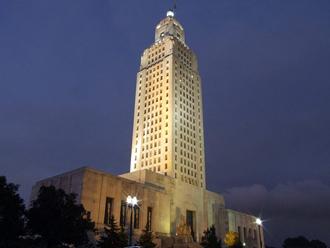"A Serious Blow to Legal Education"
A pending bill in the Louisiana Legislature that would restrict the roles of university law clinics could "deal a serious blow to legal education in our state," according to a letter written by law school deans from Tulane and Loyola universities to members of the state senate.

At the state capitol in Baton Rouge, La., a bill is pending in a legislative committee that would restrict university law clinics. Law school deans at Tulane and Loyola universities say the bill would "cripple" the clinics' work.
In that letter, Tulane Law School interim dean Stephen Griffin and Loyola University Law School dean Brian Bromberger describe the essential role of clinical legal education and decry the chilling effect that the bill would have on university law clinics.
The bill purports to regulate legal clinics but would in fact cripple them, write Griffin and Bromberger.
Senate Bill 549 by Sen. Robert Adley, R-Benton, would prohibit law clinics at any state or private university that receives state funding from suing government agencies. In addition, the bill would forbid clinics from suing individuals and businesses for financial damages and curtail the ability to raise constitutional challenges.
As stipulated in the bill, any violation of the law will "result in the forfeiture of all state funding to the university for that fiscal year."
In an interview, Griffin said that he believes the restrictive language of the bill is targeting a particular clinic. "Although the bill is aimed at the Environmental Law Clinic, the target it actually hits is far more broad and affects nearly all of our clinics negatively, which would severely hurt our curriculum and our ability to serve the community by providing access to justice."
Along with the Environmental Law Clinic, Tulane Law School operates clinics representing indigent clients in civil litigation, criminal law, domestic violence, juvenile law and legislative and administrative advocacy.
According to Griffin, SB 549's prohibition of suing the government and restriction on raising constitutional issues would have a profound and negative impact on the attorney-client relationship.
"You can't say, 'yes I'll represent you but, by the way, I can't make an argument based on a state constitutional challenge'," said Griffin.
The legislation also calls for all university law clinics to be subject to oversight by the House Committee on Commerce and the Senate Committee on Commerce, Consumer Protection and International Affairs. Currently, the Louisiana Supreme Court supervises law clinics.
"Clinics have always been supervised by the courts," said Griffin. "They operate under the strictest limitations in the country. More regulation is simply unnecessary."
Currently the bill is under review before the Senate Commerce Committee. Griffin encourages anyone interested in the welfare of clinical legal education to contact members of the committee to voice their concern. Contact information is listed here.
